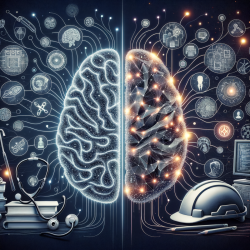The IT industry has long been associated with innovation and continuous development. With the emergence of artificial intelligence (AI) and increasingly advanced algorithms, many people are beginning to wonder if the future of this industry is threatened by the very technology it creates. Can AI take over the work of programmers, data analysts, or software engineers? Let’s take a closer look at this issue.
AI in the IT Industry – Support or Threat?
Artificial intelligence is already playing a significant role in the IT industry, automating various processes that previously required manual intervention. AI-based systems are being used for software testing, analyzing large datasets, and automating DevOps processes.
Coding Automation: Tools like GitHub Copilot, powered by language models such as GPT, can generate code snippets based on task descriptions. While they do not replace programmers, they can significantly speed up the coding process by suggesting solutions or automating simple, repetitive tasks.
Testing and Analysis: AI is capable of automatically testing software, detecting bugs that previously required hours of work by testers. Additionally, AI-driven analytical tools can analyze large datasets, identifying patterns and anomalies, potentially replacing part of the work done by data analysts.
Jobs at Risk of Automation
Some roles in IT may be more susceptible to automation than others. Here are a few examples:
- Software Testers: Automated testing using AI is already becoming standard in many companies, which may reduce the need for large teams of testers.
- IT Infrastructure Management: The automation of tasks related to infrastructure management, such as system monitoring or server management, could lead to a reduction in the number of positions in this area.
- Data Entry and Analysis: AI algorithms can automatically process and analyze vast amounts of data, potentially replacing part of the work done by analysts.
Where AI Won’t Replace Humans
Despite technological progress, there are areas where human creativity, problem-solving abilities, and decision-making remain irreplaceable:
• **System Design: **Creating software architecture, planning large-scale systems, and making strategic decisions require a deep understanding not only of technology but also of business context and user needs. • Development of New Technologies: AI can support the innovation process, but creating entirely new solutions that change the industry requires creativity, experimentation, and the ability to think outside the box. • Project Management: Effective management of teams, projects, and communication with clients are areas where interpersonal skills are crucial, and these are not fully replicable by AI.
How to Prepare for the Future?
The IT industry, while it may be partially automated, is certainly not going away. In fact, it may become even more demanding and dynamic, requiring continuous skill development from workers. To meet the challenges posed by the rise of AI, it’s worth focusing on:
• Developing Soft Skills: Communication, project management, and teamwork are qualities that will be increasingly valued. • Specializing in Niche Technologies: Expanding knowledge in niche areas, such as cybersecurity, AI development, or blockchain, can provide job stability. • Creativity and Innovation: Seeking new solutions and approaches to work will be key in a world where routine tasks are increasingly taken over by machines.
AI will undoubtedly impact the IT industry, automating many processes and changing the way we work. However, instead of viewing this as a threat, it’s worth seeing it as an opportunity for growth and transformation of the IT profession. The future of the IT industry does not lie in replacing humans with AI, but in synergy, where human creativity and innovation are supported by powerful technological tools.

